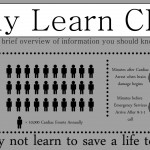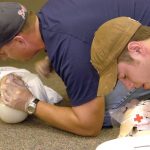Did you know that the chance of survival for cardiac arrest victims has gone up by 200%? A renowned organization has stated this in its report, provided that CPR should be administered within the initial two minutes of the attack.
More and more people are realizing the importance of learning CPR, and CPR certification is becoming increasingly popular. Learning how to perform CPR in a traditional classroom setting is beneficial. However, with the current scenario of the Covid-19 pandemic and people being left with very little time, learning CPR online is the quickest and surest way of learning these skills.
Also, the good news is that the CPR certification has been made available online for your convenience. Several reputed organizations offer online CPR classes that will help you become a certified cardiovascular resuscitator.
Let’s jump into the benefits of CPR online classes!
Here, we help you with some top advantages of online CPR training.
Varied CPR Certification Courses
You can find varied CPR certification courses available online, right from Basic CPR classes, First-aid Certification to advanced Adult CPR/AED training, Pediatric CPR classes, BLS CPR certification online for Healthcare providers, CPR & First-aid Adult-Child-Infant CPR Classes, Bloodborne Pathogens Certification, and more.
You can choose the CPR course that best fits your requirements and adds value to your current or future employment.
Class Length
Online CPR classes are shorter that will only take a few hours of your time to learn. Approximately, it takes from 30 minutes to 3 hours based on the type of CPR course you choose. Besides, the classes are tailor-made to suit individuals’ requirements and you can study at your own pace.
Another interesting point is that some classes are set up in a hybrid style that allows you to take 80% of the course online and the remaining 20% could be done hands-on and in-person for practical knowledge and experience. This gives you the advantage of taking a large portion of the course anywhere and anytime you want.
Standardized Curriculum
The online courses maintain a standardized curriculum and guidelines as set by the American Heart Association. The modules are interactive and you can retake them if you feel like you haven’t completely grasped the information.
Flexibility
One of the biggest benefits of attending a CPR course online is that you’ll have the flexibility to take the course anytime you want, either in the morning, evening or even during weekends whenever you have free time. Just get connected to the internet on your smartphone or laptop, and you are good to go.
Self-paced Learning
Most online CPR courses are tailor-made that let you learn at your own pace without feeling dragged behind by anyone. Self-paced learning allows you to access materials at your speed, which means you can focus on things you find challenging and breeze past things that you already know. This promotes greater efficiency and minimizes wasted time.
Convenience
Online CPR certification provides you the convenience to take the classes from anywhere and be certified without being physically present in the classes.
Easy & Unlimited Access
Online classes help you have easy and unlimited access to resources. You can revisit the modules if you need a refresher or for revision. Moreover, the learning centers help you choose the right material for your course with extensive resources available online.
Affordable
Online CPR certification courses are affordable, so you don’t have to worry about spending more. Also, some organizations let you take multiple testing attempts free of cost.
AHA Recognized
Most organizations that offer CPR or First-Aid certification online are AHA-recognized. However, make sure the course you sign up for is recognized by the American Heart Association and accepted by your employer.
Being aware that online CPR certification classes are beneficial, it is essential to consider a few important points before choosing a CPR class online. Read on.
While choosing a CPR course online, make sure it meets your specific requirements, relates to your job, or for specific medical conditions for which the risk of cardiac arrest is high. In addition, pay attention to the below things in advance of enrollment.
- In the first place, check if the institution you choose to enroll for a CPR certification is AHA recognized and accepted by your employer.
- Check if it is an accredited organization that follows the guidelines set up by AHA. The curriculum or training materials should meet the standards followed by ARC or AHA.
- Verify if the instructors are certified or trained with the perfect track record of their certifications being accepted by reputed organizations.
- Have a look at the varied CPR courses offered, and the course you consider signing up for meets your requirements and is valuable.
- Go through the teaching modules and instructional tools they use for the training and make sure everything falls in place to become efficiently certified.
- Last but not least, consult if the fee is affordable and meets your budget.
To sum up, do thorough research and background check to get trained as a professional cardiovascular resuscitator.
Final Word
Learning CPR makes a difference between the life and death of a person in need. With online CPR Certification classes, you can become certified at the pace of your convenience and at less time and price. An online and AHA-approved CPR certification course would be the ideal choice if you are planning to learn CPR at your convenience.
CPR Courses & First Aid Training & Certifications
Adult-Child-Infant CPR/AED & First Aid Training
Adult CPR/AED & Standard First Aid Training
Adult-Child-Infant CPR/AED Training
Online Adult, Child, Infant CPR Classes & First Aid Training
Online First Aid Course & Certification
CPR Online Classes
BLC CPR Certification Online
Online First Aid Course & CPR Certification Canada
Check out our other CPR & First Aid Related Articles:
INFANT CPR CERTIFICATION & ITS IMPORTANCE
THE IMPORTANCE OF TAKING BLS TRAINING
WHAT IS THE DIFFERENCE BETWEEN CPR AND AED TRAINING?
WHEN TO USE A MANUAL OR AUTOMATIC EXTERNAL DEFIBRILLATOR
10 THINGS YOU DIDN’T KNOW ABOUT CPR



